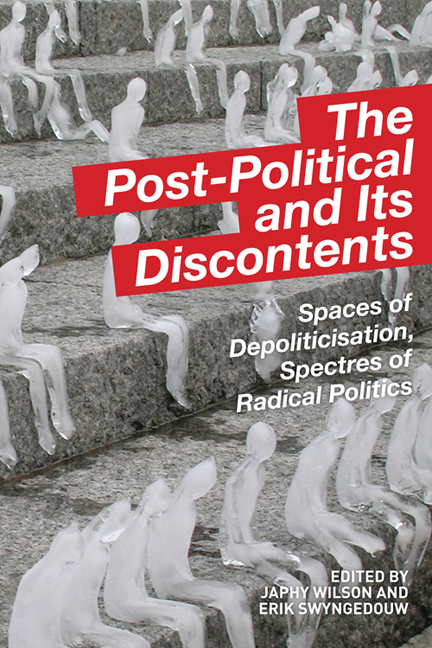Book contents
- Frontmatter
- Contents
- List of Contributors
- Seeds of Dystopia: Post-Politics and the Return of the Political
- Part I Spaces of Depoliticisation
- 1 The Post-Politics of Sustainability Planning: Privatisation and the Demise of Democratic Government
- 2 The Post-Political and the End of Nature: The Genetically Modified Organism
- 3 The New Development Architecture and the Post- Political in the Global South
- 4 Opening Up the Post-Political Condition: Multiculturalism and the Matrix of Depoliticisation
- 5 The Jouissance of Philanthrocapitalism: Enjoyment as a Post-Political Factor
- 6 Religious Antinomies of Post-Politics
- 7 Post-Ecologist Governmentality: Post-Democracy, Post- Politics and the Politics of Unsustainability
- Part II Spectres of Radical Politics
- There Is No Alternative
- Index
7 - Post-Ecologist Governmentality: Post-Democracy, Post- Politics and the Politics of Unsustainability
from Part I - Spaces of Depoliticisation
Published online by Cambridge University Press: 05 August 2016
- Frontmatter
- Contents
- List of Contributors
- Seeds of Dystopia: Post-Politics and the Return of the Political
- Part I Spaces of Depoliticisation
- 1 The Post-Politics of Sustainability Planning: Privatisation and the Demise of Democratic Government
- 2 The Post-Political and the End of Nature: The Genetically Modified Organism
- 3 The New Development Architecture and the Post- Political in the Global South
- 4 Opening Up the Post-Political Condition: Multiculturalism and the Matrix of Depoliticisation
- 5 The Jouissance of Philanthrocapitalism: Enjoyment as a Post-Political Factor
- 6 Religious Antinomies of Post-Politics
- 7 Post-Ecologist Governmentality: Post-Democracy, Post- Politics and the Politics of Unsustainability
- Part II Spectres of Radical Politics
- There Is No Alternative
- Index
Summary
International climate politics and sustainability politics more generally have entered a visibly novel phase. There is now an unprecedented consensus that the established economic order, patterns of resource exploitation, wealth distribution and lifestyles in Western(ised) consumer societies are profoundly unsustainable and in urgent need of comprehensive structural change. Yet this coincides with a form of actual policy-making that more explicitly and determinedly than ever points in precisely the opposite direction. In the wake of the financial crisis, in particular, huge public investment has been injected into re-stabilising rather than radically overhauling the existing order of unsustainability. Recent policies of debt consolidation and economic recovery have further curtailed the ability of the state to politically regulate the market and steer the economy towards sustainability. They have massively aggravated social inequality, reinforced the depletion of social capital, and provided new stimuli for accelerated resource exploitation. In the policy literature, the rhetoric of structural change has by no means disappeared, yet, in eco-politics the paradigm of ‘adaptation’ and ‘resilience’ to supposedly ‘inevitable’ environmental and social change has become dominant, and politics more generally seems to have been reduced to a best-practice competition in the execution of non-negotiable market imperatives. Partially reflecting this, the recent eco-sociological literature displays a marked loss of confidence not only in the achievability of meaningful international climate agreements, but also in a range of other narratives which were once major sources of eco-political hope: the belief in increasingly powerful and international grassroots movements for an ecologically more benign socio-economic order; the ‘ecological modernisation’ promise of techno-managerial resourceefficiency revolutions (Mol and Sonnenfeld 2000); the narrative of ‘political consumerism’ and ‘shopping for sustainability’ (Micheletti 2003; Seyfang 2005); or the claim that new forms of ‘ecological citizenship’ (Dobson and Bell 2006) and ‘alternative hedonism’ (Soper 2007, 2008) are already emerging. None of these – either individually or in combination – is likely to deliver anything like the structural transformation which is required if established norms of social justice, democratic self-determination and environmental integrity are to be maintained. Modern societies therefore seem inescapably locked into a technocratic politics of unsustainability (Bluhdorn 2007a, 2009a, 2011a).
- Type
- Chapter
- Information
- The Post-Political and Its DiscontentsSpaces of Depoliticisation, Spectres of Radical Politics, pp. 146 - 166Publisher: Edinburgh University PressPrint publication year: 2014



